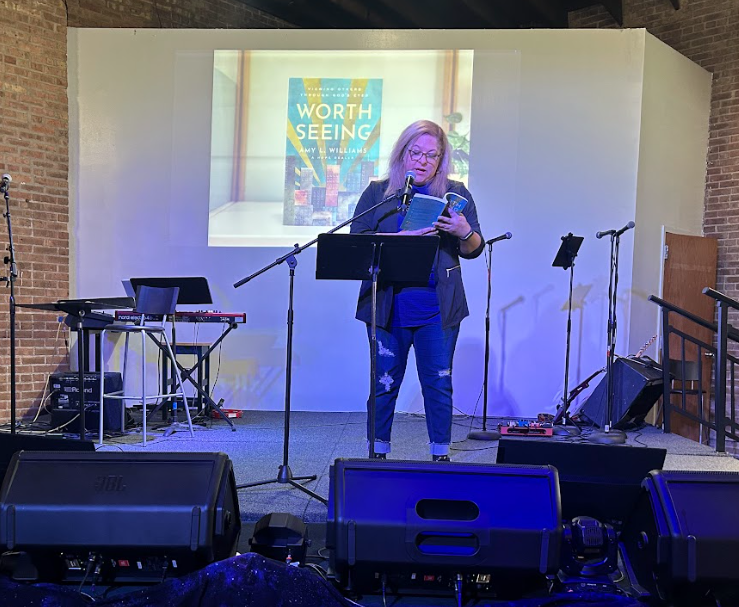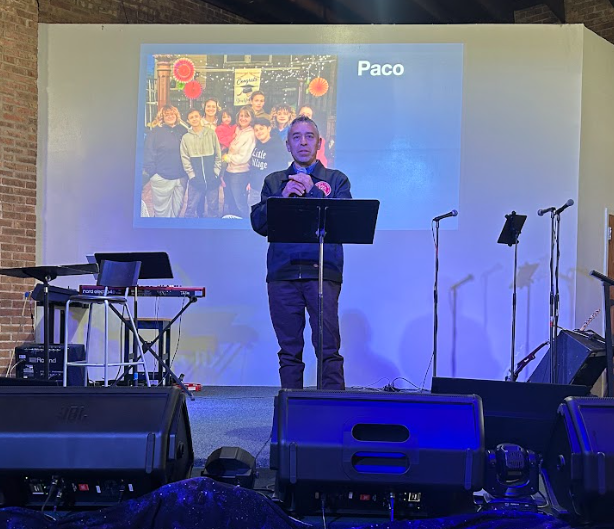Inhabit 2025 Session 3 Recap:
REPAIR
On Saturday at Inhabit 2025, we gathered to tell the truth. This third Common Session called us to name what has been harmed and stolen — to stop skipping ahead to reconciliation without first doing the holy, necessary work of repair.
We began with lament because repair requires truth-telling, grief, and courage. Before we can heal what’s broken, we have to face it.
In this session, we named tangible and intangible losses: power, wealth, identity, dignity. The effects aren’t abstract or ancient — they are felt in our neighborhoods, churches, and homes right now.
Amy Williams shared a raw story of grief and presence on her Chicago block after a young man was killed in a gang shooting. She sat on the stoop with grieving young people numbing their pain, and when one offered her a blunt, she laughed and said, “You ain’t smoking with a pastor. You’re smoking beside one.” It was a small, holy moment of belonging in grief’s thick air.
Amy reminded us, “Presence is everything, but consistency of presence is more than that.” She asked us plainly: “Where else would Jesus be?” not waiting in church pews but out in the street corners, alleys, and grief-stricken places we too often avoid.
Paco Amador brought a global perspective rooted in local solidarity. He told of the Venezuelan migrants walking thousands of miles through jungle and border to find refuge in Chicago — people who’ve lost almost everything, but whose resilience, love, and leadership are transforming neighborhoods. Paco spoke of Jose and Ada, new friends who “asked for nothing but opportunity” and whose lives now radiate faith and hospitality. “I think by the time I’m dying,” Paco said, “Jose and others like him will be leading this city into something brighter.”
The Call to Collective Repair with Pastah J
Pastah J (Rev. Dr. Jonathan Brooks) brought both fire and tenderness as he named why repair must come before reconciliation. “Why would anyone want to reconcile if you haven’t repaired what you broke?” he asked plainly. It’s common sense before it’s theology.
He named the root harm: white supremacy, and the thefts it’s committed — of truth, wealth, and power. “If you can’t name what’s broken,” he said, “you can’t repair it.”
Pastah J told a fresh, pointed retelling of Zacchaeus — not as a curious tax collector but a thief who didn’t realize the depth of his complicity until Jesus sat at his table. Zacchaeus’s first impulse was to be generous, but it wasn’t enough. “Jesus wasn’t impressed by his generosity,” Pastah J said. “He was waiting for repair.” It wasn’t until Zacchaeus repaid four times what he stole that salvation came to his house.
And for us, Pastah J reminded, “We don’t return to our communities as heroes. We go back as people complicit in harm.” That posture changes everything. It means repairing truth through whole, honest stories. Repairing wealth through redistribution and mutual support. And repairing power by surrendering control and standing in need of one another.
“Before we remember. Before we reimagine. Before we resolve — we must first repair.”
The Prophetic Voice of Tatiana Fajardo-Heflin
Tatiana Fajardo-Heflin delivered a fierce, tender, and deeply convicting poem — a prophetic call to divest from comfort and live a costly, embodied faith. She declared, “The food on your table belongs to the hungry,” and “the first shall be last, the last shall be first.” Her words confronted a faith too often obsessed with wealth, control, and comfort, challenging us to locate ourselves wherever God is — “not where purses are in plenty and bellies are always filled… not under smoke machines and flashing lights, making God seem relevant and cool.”
Tatiana’s poem painted vivid, gritty scenes of street corners, broken neighborhoods, and the places the world avoids, places where “Jesus stood on the corner, jumped rope amidst shattered glass, and welcomed me.”
Her poetry reclaims what has been devalued, reminding us of our beloveness and declaring that the Kingdom of God is near in forgotten places.
Four Movements of Repair
Pastah J shared a faithful framework for this work:
Name the harm
Tell the whole truth
Give it back
Share your power
These aren’t checkboxes. They’re a way of life and a way of joining God’s restoring work in our neighborhoods.
We closed with confession, reflection, and a liturgy of collective accountability. Because hope isn’t found in denial, but in the sacred, costly work of making things right.
Reflection Prompt
Where in your life, church, or neighborhood is repair needed before reconciliation is possible?
What truth needs to be named?
Let this be an invitation to begin.
Take the Next Step
Choose one of the four movements of repair this week:
Name the harm.
Tell the truth.
Give it back.
Share your power.
No act is too small. Repair is built on thousands of ordinary, faithful choices.





